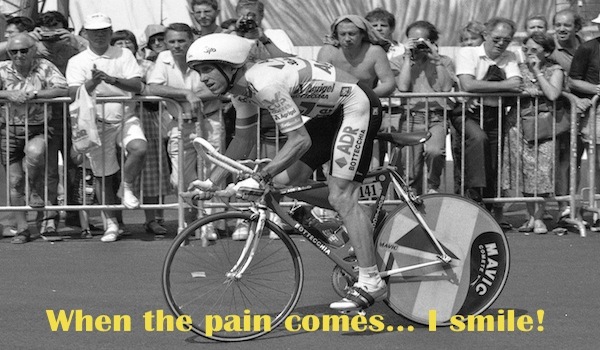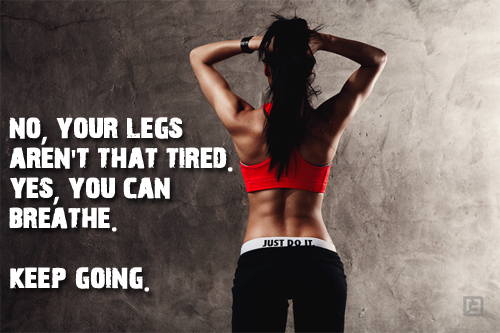Benefits of Positive Self Talk and Imagery
 Day in and day out we ride, thinking which workouts will serve to increase the endurance of our bodies. However, we tend to neglect the one body part that serves as our center of command…our brains. We need to think of this part as a “muscle” as well, in which we exercise it, push it to its threshold, just to increase it’s endurance in the next workout.
Day in and day out we ride, thinking which workouts will serve to increase the endurance of our bodies. However, we tend to neglect the one body part that serves as our center of command…our brains. We need to think of this part as a “muscle” as well, in which we exercise it, push it to its threshold, just to increase it’s endurance in the next workout.
One of triathlon’s greatest veterans (and my personal favorite), Chris “Macca” McCormick, was disliked for the mental tactics he’d use on his opponents when racing. He would study his opponents, learn their tendencies, and find a way to break their mental game. Hence, why the mental aspect of cycling is just as important as the fitness aspect. Here are some tips to improve our mental toughness during training.
Positive Self Talk
As mentioned in the previous article “Positive Talk Increases Endurance,” it’s scientifically proven how vital our mental game can be. We must train ourselves to overcome that little devil on our shoulder telling us “you can’t do this”, because if there’s anything I love more about this sport, it is the ability to prove this voice wrong every day. Being able to do this consistently, really provides us with an intangible sense of confidence. Yet, as we’ve seen with cycling, endurance isn’t gained easily, and we must train ourselves to drown this voice when it rears it’s ugly head.
One effective method is positive self talk, where we replace these negative comments we say to ourselves with positive ones. Last year, I had the pleasure of sitting in a small seminar MACCA gave, and he discussed the idea of “folders.” Essentially, he explained we must create different mental folders for diverse situations we face in training and racing. I’ve modified this idea and have named my folders “not so bad”, “ok, this sucks,” and last one, “alright, I might die today.” In these, I’ve not only placed positive comments, but also memories of training/racing triumphs, motivational quotes, and lyrics to my favorite songs.
For my first folder I have comments like “you got this”, “keep working while others sleep”, “champions are made when no one is watching.” My second folder contains specific memories in training when I really thought I’d explode, and yet completed the session successfully. Also, I use some of my favorite quotes like “embrace the suck,” “when the pain comes I smile,” “keep going, this is going to make you better”, “you’re not a quitter”’ or “you’ve faced tougher things than this!” In my third folder, I typically keep lyrics to songs I like so I can sing them to myself such as “started from the bottom now I’m here”, “lose yourself”’, or “remember the name” by Fort Minor. I also remind myself of how I started cycling and how far I’ve come. Therefore, even if I’m not PRing, I’m in a better position than last year. Last thing, I make sure to keep adding material as new experiences arise and time goes on.
Imagery
This tactic involves imagining a particular goal manifesting itself. It is a great tool even outside of cycling, which can be used to cope through injuries and life trials. When struggling through a workout you can imagine yourself to be in a race setting, where giving up is not an option. On days when I’m lacking motivation, I imagine having someone behind me, and tell myself if I slack I’ll lose the race, and dishonor my hard training to date. Sometimes for fun, I envision my favorite Pro next to me, and not wanting to embarrass myself next to them.
Imagery is subjective to one’s feelings, goals, and experiences. There is no “wrong” image as long as it’s not one with negative outcomes or emotions. The idea is to stay positive and place yourself in an image where you are succeeding. Also, it helps to practice this often, and be as detailed as possible when creating the mental scene. By using this tactic, we can improve motivation, effort, and desired outcomes. It can also be used to decrease anxiety towards a particular experience such as riding in a large group, mountain biking over a treacherous hill, or returning from a cycling crash. The more we go over these scenes in our mind, the better prepared we will be when encountering these scenarios in real life.
By using both of these sport psychology tactics, we can increase our mental toughness in a sport that requires endurance in multiple ways. Sometimes the best athletes in cycling aren’t necessarily the most talented, but the most mentally tough, and know how to “suffer” more than their opponents.
 In a study
In a study